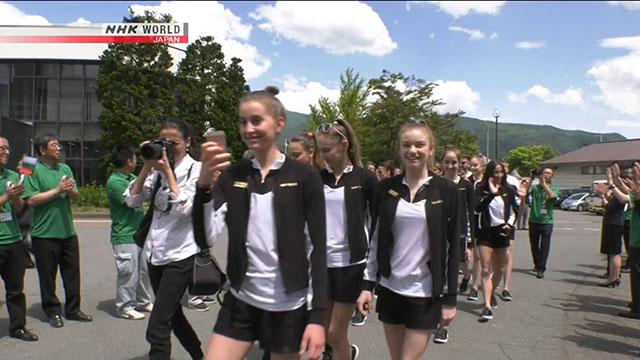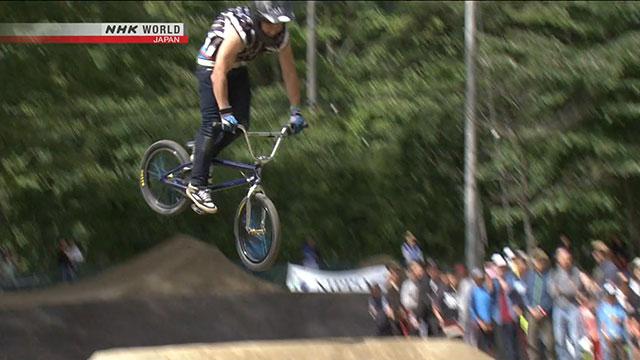Small city hosts big Olympic dreams
Saturday marks 1000 days before the start of the 2020 Tokyo Olympics. As the event gets closer, NHK World will be bringing you the latest developments on the upcoming Summer Games.
This looks at some of the Japanese towns and cities helping international athletes compete on the world's biggest stage.
Nearly 200 locations across the country have registered to host pre-Olympic training camps. The city of Okinawa was one of the first to reach a deal, agreeing to host New Zealand's karate team.
Okinawa Prefecture is the birthplace of karate. But accommodating to the demands of foreign athletes can be a big challenge for small cities hoping to take part in the Olympic movement.
One small city is hosting Bulgaria's rhythmic gymnasts. After leaving Japan, the Bulgarians went on to win silver at the world championships. The team is scheduled to hold 3 more training camps in Murayama during the lead up to 2020.
Tokyo Olympic organizers are trying to help national teams find the best places to train. They've launched a website that lists facilities and locations, as well as how to contact people in charge.
As cities promote themselves to attract international sporting teams, a young Japanese athlete has relocated to a city away from home in the hope of making his Olympic debut on home soil.
Gymnasts bring hope and exchange

People in the northern Japanese city of Murayama have made exhaustive preparations to host a team of gymnasts from Europe.
Katsuhiko Yaguchi is in charge of the city's plans for the 2020 Games. It was his idea to host foreign athletes ahead of the main event.
"I hope the exchange between Murayama and Bulgaria will help promote our city," he says.
One of his main concerns is ensuring the visitors eat well.
"I want the athletes to enjoy Japanese food," says Yaguchi.
After consulting with a chef, a local menu is chosen. One reason is to help the athletes get used to Japanese cuisine.
The Bulgarian rhythmic gymnastics team arrives, kicking off the first of four planned training camps. This time they're staying for two weeks.
They mean business as a medal hope. This team won bronze at the last Olympics in Rio de Janeiro.
Locals have been learning Bulgarian in a bid to help the athletes settle in. Many have been encouraged to put their hands up to volunteer.
They're doing their best to create a comfortable environment. And they're ironing out any problems, even a wrinkled ribbon.
The gymnasts bring a welcome sense of energy to Murayama, a city that's home to 25,000 people. They're pleased with the local hospitality.
The Bulgarians close their training camp with a free public performance. All 2000 seats are filled inside the hall as the audience is struck by the athletes' talent and grace.
"People here have helped us from the beginning to end," says one Bulgarian athlete. "We couldn't have gotten through without them."
"We've seen that a small city like ours can pull together and accomplish something big and worthwhile," says Yaguchi.
The training camp ends, but the Bulgarians will be back in a year in another step towards their quest for Tokyo gold.
Japanese BMXer's quest for 2020

BMX started as a fun race for children in the US, but its popularity has surged in recent years, attracting young riders around the world.
There is only starting hill in Japan that meets international standards and is capable of producing the complex, gravity-defying jumps that define BMX Freestyle.
16-year-old Yuma Oshimo is aiming to represent Japan when the sport debuts in 2020.
While Oshimo is one of the best in Japan, he lacks big tricks needed to compete on the biggest stage.
He moved away from his family after finishing junior high school so he could train at the track daily. He lives alone in this small apartment. No television, no video games, just his bike and a computer to watch BMX footage, all aimed at becoming the best. He thinks the course is ideal.
"There is no jump in Japan with more air time," he says. "I can improve my tricks here."
His coach Yuta Kurise designed the course. He thinks Oshimo can become a world star.
"If you memorize how much you turn the handle bar, your body moves automatically," Kurise tells him.
Kurise's advice is another reason Oshimo wanted to come here.
Last month, the track hosted its first international competition. For Oshimo, it was his first time competing against some of the top riders in the world.
He placed first among Japanese, but didn't fare so well against world class competition. He says it's motivated him to train even harder.
"This result is far from good enough," he says. "I need to practice much. Top international riders are always improving and I need to catch up with them if I want to go to the Olympics."